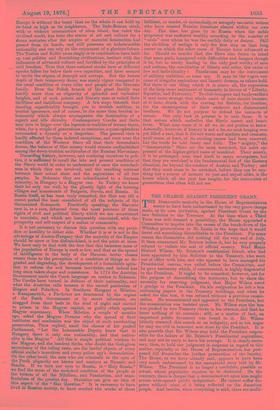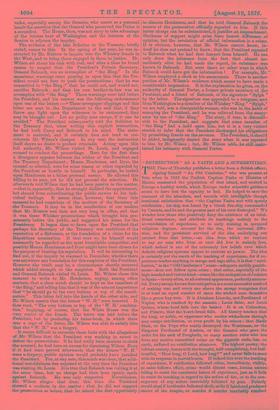THE CHARGE AGAINST PRESIDENT GRANT.
MHE Democratic majority in the House of Representatives seems to have been embarrassed by the very grave charge made, at its own invitation, against President Grant by the late Solicitor to the Treasury. At the time when a Third Term was still deemed a possibility, the House appointed a Committee to inquire into the causes of the break-down of the Whiskey prosecutions in St. Louis, in the hope that it would ferret out something discreditable to the President. For some- reason the Committee did nothing till the very end of July. It then summoned Mr. Bristow before it, but he very properly refused to violate the seal of official secrecy. Next Major Bluford Wilson, Mr. Bristow's confidential friend, who had been appointed by him Solicitor to the Treasury, who went out of office with him, and who appears to have managed his Presidential canvas, was called before the Committee, and he gave testimony which, if corroborated, is highly disgraceful to the President. It ought to be remarked, however, not for the purpose of discrediting the testimony, but to show the necessity for reserving judgment, that Major Wilson owed a grudge to the President. On his resignation he left a box containing papers in the Treasury buildings, and when he asked for this box, it was refused without a previous exami- nation. He remonstrated and appealed to the President, but the examination was insisted upon. Mr. Wilson says the box was packed by two Treasury clerks in his absence, and that he knew nothing of its contents ; still, as a matter of fact, an important public document was found in it. Mr. Wilson bitterly resented this search as an indignity, and in his anger he may see evil in innocent acts done by the President. It is also possible that Mr. Wilson may hold the President respon- sible for the failure of Mr. Bristow's Presidential aspirations, and may not be sorry to have his revenge. It is clearly neces- sary, then, to hold our judgment in suspense in regard to this matter, especially as the House of Representatives has post- poned till -December the further prosecution of the inquiry. The House, as we have already said, appears to have been very much embarrassed by the unexpected story told by Mr. Wilson. The President is no longer a candidate, possible or actual, whose popularity requires to be shattered. On the contrary, there is danger that a determined set upon him might arouse wide-spread public indignation. He cannot suffer .dis- grace without some of it being reflected on the American people. And besides, when everything is said, there are multi- tudes, especially among the farmers, who resent as a personal insult the assertion that the General who preserved the Union is a scoundrel. The House, then, was not sorry to take advantage of the intense heat of Washington and the lateness of the Session to adjourn the inquiry. The evidence of the late Solicitor to the Treasury, briefly stated, comes to this. In the spring of last year, he was in- structed by Mr. Bristow to inquire into the Whiskey frauds in the West, and to bring those engaged in them to justice. Mr. Wilson set about his task with zeal, and after a time he found reason to suspect that the President's Private Secretary, General Babcock, was an accomplice of "the Ring." In the meantime, warnings came pouring in upon him that the Pre- sident would not dare to push the prosecutions ; that he was committed to "the Ring ;" that he could not, and would not, sacrifice Babcock ; and that his own brother-in-law was an accomplice with "the Ring." These warnings were laid before the President, and his answer was the following endorsement upon one of the letters :—" These newspaper clippings and this letter are sent to the Department to the end that, if they throw any light upon the witnesses to be summoned, they may be brought out. Let no guilty man escape, if it can be avoided." The President subsequently told the Solicitor to the Treasury that, when writing this explicit instruction, he had both Casey and Babcock in his mind. The state- ment is material, and it certainly does not tend to cor- roborate Mr. Wilson's charges. In any case, the instruction itself shows no desire to protect criminals. Acting upon this full authority, Mr. Wilson visited St. Louis, and engaged counsel to conduct the proceedings. Here for the first time a divergence appears between the wishes of the President and the Treasury Department ; Messrs. Henderson and Dyer, the counsel so selected, were for some reason or other regarded by the President as hostile to himself. In particular, he looked upon Henderson as a bitter personal enemy. He allowed this felling to be seen, yet he did not prevent the selection. He afterwards told Wilson that he had been passive in the matter, —that is, apparently, that he strongly disliked the appointment, but shrank from subordinating the public service to his indi- vidual feelings. It seems clear, however, that from this moment he had suspicions of the motives of the Secretary of the Treasury. It may be in the recollection of our readers that Mr. Bristow was then not very long in office, and that it was these Whiskey prosecutions which brought him pro- minently before the public, and suggested his name for the Presidency. It began then to dawn upon the President that perhaps his Secretary of the Treasury was ambitious of the reputation of a Reformer, as the foundation of a claim for the Republican nomination. If that were so, he himself would necessarily be regarded as the most formidable competitor, and possibly Messrs. Henderson and Dyer might have been chosen for the purpose of blasting his reputation. It will be interesting to find out, if the inquiry be resumed in December, whether there was anywhere any foundation for this suspicion of the President. However .the truth may be, a circumstance shortly occurred which added strength to the suspicion. Both the President and General Babcock visited St. Louis. Mr. Wilson chose this moment to write to Mr. Henderson, urging, among other matters, that a close watch should be kept on the members of "the Ring," and telling him that it was of the utmost importance that "he should go to the very bottom or top of the combi- nation." This letter fell into the hands of the other side, and Mr. Wilson asserts that the letters "W. H." were inserted. It then read, "The very bottom or top of the 'W. H.' combina- tion," implying, of course, that the White House was the very centre of the frauds. The letter was laid before the President, but by producing his letter-book, in which there was a copy of the letter, Mr. Wilson was able to satisfy him that the "W. H." was a forgery. It seems difficult to reconcile these facts with the allegations of Mr. Wilson that the President was working in secret to defeat the prosecutions. If he had really been anxious to cloak the accused, he had here an excuse for dismissing Wilson. Even if it had been proved afterwards that the letters "W. H." were a forgery, public opinion would probably have justified the President. For, at any rate, this much was clear, that addi- tional watchfulness was enjoined at the very time the President was visiting St. Louis. It is true that Babcock was visiting it at the same time, bat no charge had then been openly made against Babcock. He was only suspected. Nevertheless, Mr. Wilson alleges that from this time the President showed a coolness in the matter ; that he did not support the prosecution as before, that he seized the first opportunity
to diamiss Henderson, and that he told General Babcock the
secrets of the prosecution officially reported to him. If this latter charge can be substantiated, it justifies an impeachment. Slackness of support might arise from honest difference of opinion, but the revelation of official information is a crime. It is obvious, however, that Mr. Wilson cannot know, in- deed he does not pretend to know, that the President repeated to Babcock what he had first learned from himself. He can only draw the inference from the fact that almost im- mediately after he had made the report, its substance was known to Babcock. But were there no other ways in which Babcock could have got the information ? For example, Mr:- Wilson employed a clerk as his amanuensis. There is another portion of Mr. Wilson's evidence which seems to have made a considerable impression. It is the explanation he gives, on the authority of General Porter, a former private secretary of the President, and a friend of Babcock, of the signature " Sylph " by the latter. The signature was appended to a telegram sent from Washington to a member of the Whiskey "Ring." "Sylph," we are told, was a disreputable woman, who was in the habit of annoying the President, and he was relieved from the annoy- ance by one of "the Ring." The story, if true, is discredit- able to the President, and suggests that some member of "the Ring" had a hold upon him, but it is a very violent stretch to infer that the President discharged his obligations by permitting frauds on the revenue. The President, it should be added, indignantly denied the story when it was repeated to him by Mr. Wilson ; but, Mr. Wilson adds, he still main- tained his intimacy with General Porter.































 Previous page
Previous page